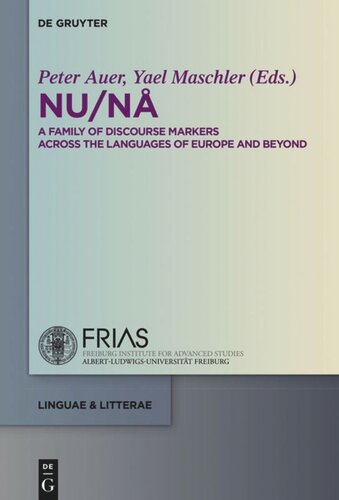

Most ebook files are in PDF format, so you can easily read them using various software such as Foxit Reader or directly on the Google Chrome browser.
Some ebook files are released by publishers in other formats such as .awz, .mobi, .epub, .fb2, etc. You may need to install specific software to read these formats on mobile/PC, such as Calibre.
Please read the tutorial at this link: https://ebookbell.com/faq
We offer FREE conversion to the popular formats you request; however, this may take some time. Therefore, right after payment, please email us, and we will try to provide the service as quickly as possible.
For some exceptional file formats or broken links (if any), please refrain from opening any disputes. Instead, email us first, and we will try to assist within a maximum of 6 hours.
EbookBell Team

4.0
56 reviewsThis book, situated within the framework of Comparative Interactional Linguistics, explores a family of fourteen discourse markers across the languages of Europe and beyond (Yiddish, Hebrew, Russian, Polish, Romani, Estonian, Finnish, Upper Saxonian and Standard German, Dutch, Icelandic, and Swedish), arguing that they go back to one, possibly two, particles: NU/NÅ.
Each chapter analyzes the use of one of the NU/NÅ family members in a particular language, usually on the basis of conversational data, feeding into a comprehensive chapter on the structure, function, and history of these particles. The approach taken in this volume broadens the functional linguistic concept of ‘structure’ to include the sequential positioning of the particles and their composition, and the concept of ‘function’ to include the conversational actions performed in interaction. Employing conversation analytic methodology thus enables a study of the ways these particles acquire meaning within certain sequential and action environments -- both cross-linguistically and with regard to the grammaticization of the particles. All this sheds light on the borrowing patterns of NU/NÅ across the languages.
With contributions by Peter Auer, Galina B. Bolden, Gonen Dori-Hacohen, Andrea Golato, Harrie Mazeland, Auli Hakulinen, Helga Hilmisdóttir, Leelo Keevallik, Hanna Lehti-Eklund, Anna Lindström, Yael Maschler, Yaron Matras, Gertrud Reershemius, Mirja Saari, Lea Sawicki, Marja-Leena Sorjonen, Heidi Vepsäläinen and Matylda Weidner.